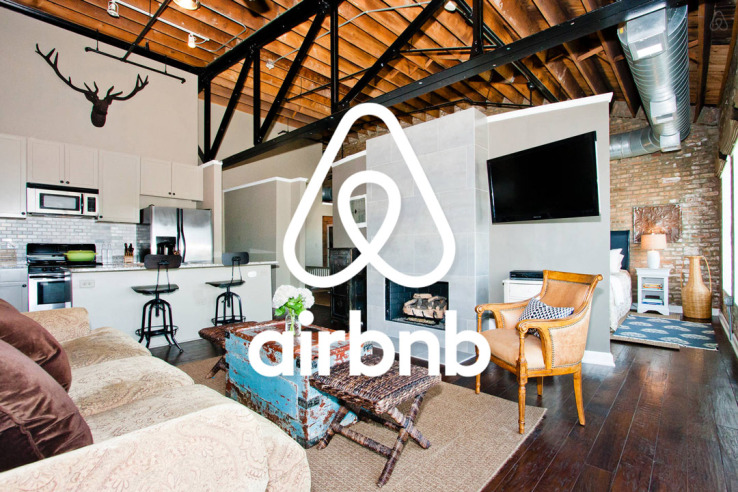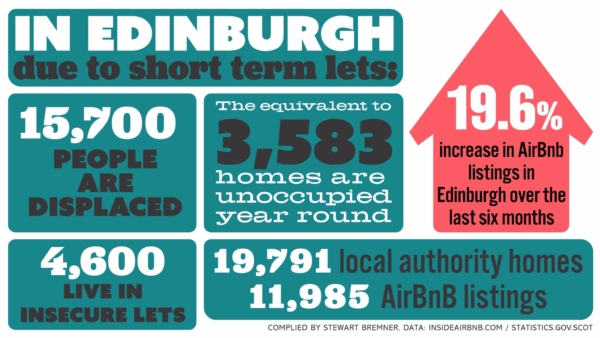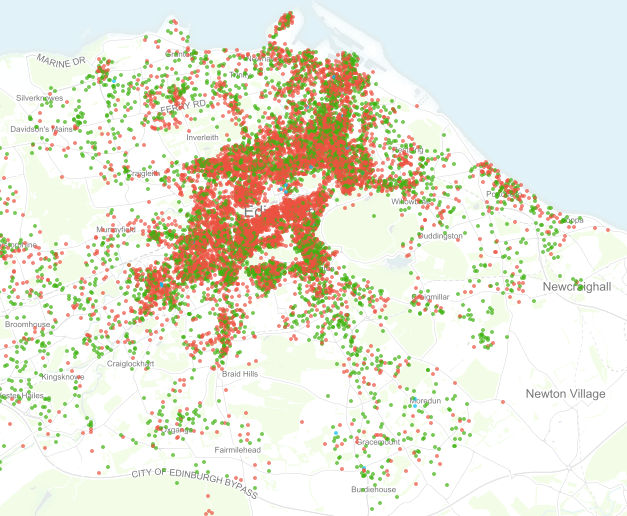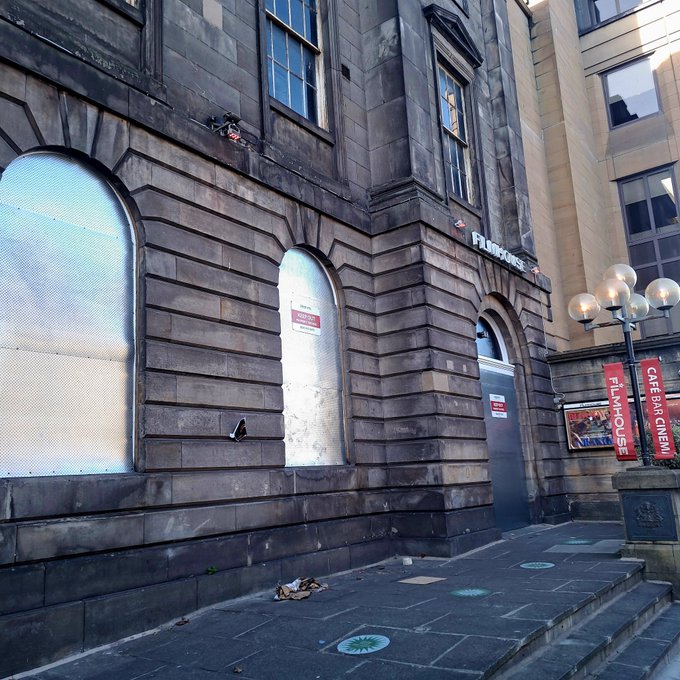Housing and Arts, a Vicious Circle
Rosie Priest investigates the unsurprising (but overlooked) nexus between: a city designed for tourists; a bankrupt arts sector and a housing policy that drives social cleansing.
The proposed initiative to crack down on short term lets in Edinburgh city has been postponed. But what do the arts have to do with it?
Well, it was primarily art sector leaders lobbying against rental reforms, with the Fringe Society’s Chief Executive claiming that the proposed planning guidance for short-term lets in the City of Edinburgh was “draconian”. The arts sector clear pressure on the council and government has resulted in delays to procedures which would significantly reduce poverty and curb preventable deaths of homeless residents.
This week I wrote to the arts organisations, their boards, and their staff to seek clarity on their actions: for this I need to apologise. Whilst board members and executives are responsible for organisations actions, staff are not. In anger and frustration my actions were not care driven, I am fortunate to know a lot of the people who work in these organisations, and they continuously work hard to make positive changes in the sector, and society. I am not envious of their immensely complex jobs. It is the arts leaders who are lobbying against reform, not arts workers.

Of the nearly 8000 short term lets available on AirBnB alone (Edinburgh has the highest rates per capita in the UK, with some areas of the city having 1 in every 3 homes designated an AirBnB), around 5000 of those are entire homes, half of those are owned by landlords with multiple properties (the data on Edinburgh AirBnB’s can be found here). The AirBnB’s are empty for an average of 277 days a year – occupied predominantly around August.
As the society’s chief executive claims “The history of home-sharing during the festivals goes right back to their earliest days. The idea that that was almost going to become impossible would have been the final nail in the coffin” is encouraging a false narrative. Most homes being rented are entire properties, by landlords with more than one property to let. In fact the legislation states “for those letting a room or rooms within their own home temporary licences will be available giving first time hosts the flexibility and opportunity to try out short-term letting before a full licence application is made”, which highlights either the chief executive of the Fringe Society does not fully understand the regulation, or is willingly misrepresenting the legislation to create panic and support for its dismissal.
“But why is this so important?” you may be thinking. Edinburgh Poverty commission has stated that the need for affordable property and access to homes in the city is the leading driver of poverty in the city. Worryingly, Edinburgh residents who have died homeless has increased by 150% in just 5 years. 44 residents of Edinburgh died on its streets last year, whilst 5000 homes sat empty. All of this is of course linked to Edinburgh’s 5000 empty AirBnB homes, as research shows an abundance of AirBnBs in a city drives up housing costs and increases poverty and homelessness.

from 2019
The arts sector’s active championing of the legislations demise is furthering poverty in the city. I doubt any of the friends and families of the 44 homeless residents who lost their lives in the city would care if the city lost its claim to be a “culture capital”, nor the 3000 families waiting for council homes or the 2400 households who are currently homeless in the city. And as these statistics highlight, homelessness will only increase. There are many people undocumented as homeless taking extreme measures to stay warm this winter. Landlords responsible for the 5000 homes empty for 277 days of the year, half of which are run by landlords with multiple properties, are profiteering from the festival leading to the very literal deaths of the city’s people.
There have been arguments made that the legislation needs further exploration to consider the impacts on the city, such as reduced accommodation for artists and audiences during the festival period in August. Organisations argue that the new legislation will have detrimental impacts on Edinburgh’s economy. However, what is not being discussed is the hugely positive economic impact of the legislation. If the 5000 entire homes which sit empty for 277 days of the year became available – that’s potentially thousands of residents contributing to the city’s economy year-round. Hypothetically, if 2 people were to live in each of those homes long term and contributed just £10 a week to the city through take away coffees or trips to the cinema, that’s over £5million annually pouring into the city. Many of the arts organisations who have been championing the demise of the legislation could benefit from residents with secure and safe homes, and they could become audiences and participants year-round. In fact, as we know arts workers earn less and feel less valued than many other workers in different sectors. Improved housing in Edinburgh could benefit many of the arts workers who are struggling the most in the sector.

When we consider the upsetting closure of the Edinburgh Filmhouse, could a city with an additional 10,000 residents living in safe, secure and long-term accommodation, who aren’t grappling with and struggling through poverty have benefitted that arts institution? In fact, how much would the festivals and the arts organisations more generally benefit from having residents occupying these empty homes year-round? Most festival audiences are Edinburgh residents themselves, surely these numbers would grow if the legislation was passed? These are all hypothetical situations, but what we do know as fact, is that high numbers of AirBnB’s in a city increases poverty and housing precarity.

If arts leaders are attempting to diminish the legislation which will decrease poverty and improve the lives of those living in Edinburgh, they are enacting violence on the people of this city. And worse, they are enacting this violence on the residents of this beautiful and vibrant city who have the least, many of whom their own organisations attempt to work with through ‘outreach’ interventions and ‘community’ projects.
I’ve written it many times: but this city is not a festival, it is a home. Please can we as a sector together push for a positive change that will lead to a reduction in poverty first, and then figure out how the festivals work around that second?

ICYMI –
http://www.soillse.ac.uk/wp-content/uploads/Co-labhairt-Shoillse-Steornabhagh-Beurla-Mac-a-Bhaillidh.pdf
i think the essential missing link in this opinion piece is how do homeless people pay for these houses either to purchase or rent?
Apart from St Andrews , Edinburgh is the only place in Scotland where there are not properties to purchase under £100,000. one need only check the main websites.
the city council and social landlords have to focus on new builds and speed up the use of vacant and dilapidated land and properties in the city which are owned by the public sector.
If the SG introduced AGFRR then that would force owners to develop sites or dispose of them as quickly as possible. the price of land will plummet and enable much more development for energy efficient housing.
I think it works together though – AirBnB raises house prices across the board, it also reduces the option for councils to take advantage of housing already built to house people in. Ann’s comment highlights that this isn’t unique to Edinburgh, the highlands are experiencing something similar – it’s not that there’s not enough homes for people if the SG/council were to buy the predominantly empty AirBnB’s (5000 full entire homes) that would resolve the 3000 families waiting for council housing + some. I think these things need to work together, it’s not so black and white. But by capping AirBnB’s the council can control the spike Edinburgh has in both rental and purchased homes which as you highlight is more than anywhere else in Scotland. Building new homes also takes a very long time, during the 3 years it may take to build a housing estate what damage will AirBnB have done on the housing market in that time? I think both short term letting controls and new builds need to happen.
Air Bn’B started out as peer to peer “couch surfing”. A way for people short of cash to get a short doss on a friendly stranger’s sofa-bed in exchange for beer-money. Remember those days?
People letting an entire property out as short-stay holiday accommodation on Air Bn’B are running a commercial business and should be regulated and taxed as such. The property for rent should be subject to a formal change of use from domestic dwelling house to business premisses using the existing planning application process. How many would receive planning permission if the reality of their actual usage was made explicit?
Does the City of Edinburgh’s Local Development Plan state that it hopes to reduce the number of dwelling houses available by a third and more? If not, why is this being allowed to happen? Why is a tiny minority of the population allowed to extract all the amenity value from a neighbourhood and remain unregulated?
What kind of country or city allows it’s housing stock to be misused in this grotesque way?
The thing that this article misses is the fact that, while the air bnb issue is a massive problem this has also adversly affected the festivals – flats which were formerly occupied by students over the year and available for festival lets are now being used for tourist accomodation – pushing up the costs for both residents and the festival teams.
The idea that getting rid of the festivals – as this author appears to suggest – would solve all the city’s problems is patently absurd – the festivals create significant employment to the city and massive income to local businesses. Sensibly thought through legislation – with engagement with all stakeholders could benefit everyone. The legislation that was suggested was not this.
Absolutely not suggesting getting rid of festivals – but saying that the silo of a huge housing crisis, which is a form of social injustice, happening needs to change and we need to change our approach in the arts. As an arts worker, someone who has benefitted from the festivals for nearly a decade I do not want to see their demise, but their actual integration into a city that can thrive year round.
Quote; The idea that getting rid of the festivals
Lets explore this idea.
Whats the point of the Edinburgh Colonial August Festivals? Why are locals pushed out of their own city for close to 6 weeks in the summer for a bunch of trophy wife grotesques & a clique of Ghislaine Maxwell archetypes? Edinburgh is a human-sh*t-magnet during August. It is a wretched stressful overcrowded place.
And of all this is done with zero consent or permission from locals.
Discuss.
But the facts don’t agree with your statement – 39% of ticket sales for the festival were to local residents – https://www.scotsman.com/whats-on/arts-and-entertainment/edinburgh-festival-fringe-sells-more-than-22-million-tickets-in-75th-anniversary-year-3822995?amp – suggesting that the fringe is something they want and enjoy.
This is not to say that things can’t (or shouldn’t) be improved, they should. But to claim no local support for the festival is just wrong
Thanks for the article Rosie.
Totally share your dismay that the government have bowed to the lobbying of the landlords and the festivals – evidenced by the rather telling claim from Shona Robison MSP saying: “This is a one-off six month extension, which recognises the wider economic circumstances of the cost-of-living crisis that is placing pressure on existing short-term let hosts and businesses”. Good to see the Cabinet Secretary for Housing prioritising the landlords in the cost of living crisis.
The lines appear to have come from Festivals’ lobbying paper:
https://www.edinburghfestivalcity.com/assets/000/005/409/Short_Term_Lets_-_City_of_Edinburgh_Council__Sept_2022__original.pdf?1662585265
which central claim rests the rather spurious data that local residents provide 20,000 bed nights each night of the festival, by giving up their main residence. Like 3000 – 5000 middle class Edinburgh households renting out their own home for the month? I don’t buy it…
As usual I think the Festivals are lobbying for themselves and their well renumerated positions rather than the wider city of Edinburgh, and I think the writer is spot on to note how the Festivals boosterist version actually damages the wider year round lived culture in the city
Thanks John
If you are interested in the community impacts of short=lets across Scotland have a read of this report. The aim of this Scottish Government funded research study was to assess the impact, both positive and negative, of short-term lets across Scotland, with a focus on communities, particularly on neighbourhoods and housing. It explores the impacts of STLs from the perspective of residents, hosts, community actors, and local businesses.
https://www.gov.scot/publications/research-impact-short-term-lets-communities-scotland/
Thanks Douglas